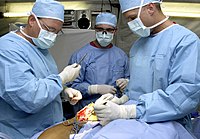surgeon
Jump to navigation
Jump to search
See also: Surgeon
English[edit]

Alternative forms[edit]
- chirurgeon (archaic)
Etymology[edit]
From Middle English surgien, borrowed from Anglo-Norman surgien, sirogen (Old French surgien et al.), from Vulgar Latin *chīrurgiānus, from Latin chīrūrgia (“surgery”), from chīrurgus (“surgeon”), borrowed from Ancient Greek χειρουργός (kheirourgós), from χείρ (kheír, “hand”) + ἔργον (érgon, “work”). Doublet of chirurgeon.
Pronunciation[edit]
- (UK) IPA(key): /ˈsɜːd͡ʒən/
Audio (Southern England) (file) - (General American) IPA(key): /ˈsɝd͡ʒən/
- Rhymes: -ɜː(ɹ)d͡ʒən
Noun[edit]
surgeon (plural surgeons, feminine surgeoness)
- One who performs surgery; a doctor who performs operations on people or animals.
- The surgeon refused to operate because the patient was her son.
- A surgeonfish.
Usage notes[edit]
- In the UK, a surgeon holds a fellowship or a postgraduate degree in order to be known as a surgeon. For instance: FRCS or Master of Surgery
- In the United States, a surgeon belongs to a subcategory of doctors (physicians) whose practice is largely or exclusively focused on surgery. They generally hold a credential from a medical body regulating the specialty in which they practice.
Synonyms[edit]
- sawbones (slang)
- chirurgeon (archaic)
Derived terms[edit]
- aesthetic surgeon
- barber surgeon
- bottom surgeon
- brain surgeon
- cardiosurgeon
- cosmetic surgeon
- cryosurgeon
- cybersurgeon
- dental surgeon
- dermasurgeon
- electrosurgeon
- heart surgeon
- microsurgeon
- nanosurgeon
- neurosurgeon
- oral surgeon
- orthopedic surgeon
- otosurgeon
- plastic surgeon
- psychic surgeon
- psychosurgeon
- rocket surgeon
- staff surgeon
- supersurgeon
- surgeoncy
- surgeon-dentist
- surgeoness
- surgeonfish
- surgeon general
- surgeon-general
- surgeonlike
- surgeonly
- surgeon major
- surgeonry
- surgeonship
- surgeon's knot
- telesurgeon
- top surgeon
- tree surgeon
- veterinary surgeon
Translations[edit]
doctor who performs surgery
|
Further reading[edit]
French[edit]
Etymology[edit]
Inherited from Middle French sourgon, sourjon, from Old French sorjon, sourjon (“source”) (1200s), from a conjugated form of sourdre (see sourjant) + -on, from Latin surgere. The modern spelling dates from 1541.
Pronunciation[edit]
Noun[edit]
surgeon m (plural surgeons)
- (botany) shoot (new growth from the trunk of a tree)
- (figurative) offshoot, rebirth (something that is reborn or grows out of something else again)
- (archaic) offspring, progeny (descendant of someone)
Further reading[edit]
- “surgeon”, in Trésor de la langue française informatisé [Digitized Treasury of the French Language], 2012.
Anagrams[edit]
Categories:
- English terms derived from Proto-Indo-European
- English terms derived from the Proto-Indo-European root *ǵʰes-
- English terms derived from the Proto-Indo-European root *werǵ-
- English terms inherited from Middle English
- English terms derived from Middle English
- English terms derived from Anglo-Norman
- English terms derived from Vulgar Latin
- English terms derived from Latin
- English terms derived from Ancient Greek
- English doublets
- English 2-syllable words
- English terms with IPA pronunciation
- English terms with audio links
- Rhymes:English/ɜː(ɹ)d͡ʒən
- Rhymes:English/ɜː(ɹ)d͡ʒən/2 syllables
- English lemmas
- English nouns
- English syncopic forms
- en:Healthcare occupations
- en:People
- French terms inherited from Middle French
- French terms derived from Middle French
- French terms inherited from Old French
- French terms derived from Old French
- French terms inherited from Latin
- French terms derived from Latin
- French 2-syllable words
- French terms with IPA pronunciation
- French terms with audio links
- French lemmas
- French nouns
- French countable nouns
- French masculine nouns
- fr:Botany
- French terms with archaic senses